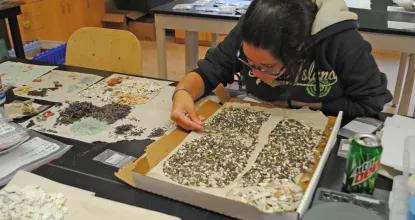
A degree in Sociology.
Students studying sociology will discover it is an exciting, demanding and diversified academic discipline. At its foundation, sociology is the scientific study of society and human social behavior. It is concerned with the social causes and consequences of human behavior. This basic understanding will help graduates begin careers in fields, such as business, law, health care, human services, government, politics and public administration. Students who hold this degree are well prepared for graduate study. The concentration in social justice examines the causes and consequences of inequalities based on class, gender, race/ethnicity, disability, age and sexual orientation. Social processes that contribute to or reduce inequalities are also studied.
See the Summer 2024 special issue of Footnotes, published by the American Sociological Association (ASA), for stories and testimonials from student and professional sociologists on the value of sociology.
- Abuse of Power, a publication on teachers who bully students by Alan McEvoy.
- The New Masculinity, a WNMU public television interview on male violence featuring Alan McEvoy.
- The Native Spirit, a poetry collection by Renxin Yang.
- Gambling Among Prison Inmates: Patterns and Implications, an article in The Journal of Gambling Studies by Alan McEvoy and Nicole Spirgen.
- Routine Activities Theory Reconsidered: The Case of Inmate Gambling. In The Academy of Criminal Justice Sciences Today, by Alan McEvoy.
- Alexander M. Stoner (co-authored with Harry F. Dahms) (2023) Freedom and Heteronomy in the Anthropocene. Paragrana: International Journal of Historical Anthropology, Vol. 33, pp. 39-52.
- Alexander M. Stoner (2022) Marx, Critical Theory, and the Treadmill of Production of Value: Why Environmental Sociology Needs a Critique of Capital. In Current Perspectives in Social Theory 37: 89-110.
- Alexander M. Stoner (2021) Things Are Getting Worse on Our Way to Catastrophe: Neoliberal Environmentalism, Repressive Desublimation, and the Autonomous Ecoconsumer. Critical Sociology 47(3): 491-506.
- Johnson, K. & Stoner, A. M. (2021). Neoliberal managed care and the changing nature of social work practice: Exploring the relationship between authoritarianism and burnout among US social workers. Social Work & Social Sciences Review, Vol. 22.
- Alexander M. Stoner (2020) Critical Reflections on America’s Green New Deal: Capital, Labor, and the Dynamics of Contemporary Social Change. In Capitalism Nature Socialism 32(1): 77-94.
- Alexander M. Stoner (2018) Stuck in the Anthropocene: the problem of history, theory and practice. In Interrogating the Anthropocene: The Future in Question, Palgrave Macmillan, pp. 105-132.
- Alexander M. Stoner (co-authored with John H. Bradford) (2017) The Treadmill of Destruction in Comparative Perspective: A Panel Study of Military Spending and Carbon Emissions, 1961-2014. Journal of World-System Research 22(3): 298-325.
- Alexander M. Stoner (co-authored with Andony Melathopoulos) (2016) If climate “changes everything”, why does so much remain the same? The dynamic of capitalism and discontents around climate change. Logos: A Journal of Modern Society and Culture vol. 14 no. 4.
- Alexander M. Stoner (co-authored with Andony Melathopoulos) (2015) Critique and Transformation: On the Hypothetical Nature of Ecosystem Service Value and its Neo-Marxist, Liberal and Pragmatist Criticisms. Ecological Economics (117): 173-181.
- Alexander M. Stoner (2014) Sociobiophysicality and the Necessity of Critical Theory: Moving beyond Prevailing Conceptions of Environmental Sociology in the USA. Critical Sociology 40(4): 621-642. [Winner of the American Sociological Association (ASA) 2013 Albert Szymanski-T.R. Young/Critical Sociology Marxist Sociology Graduate Student Paper Award]
- Alexander M. Stoner (co-authored with Eric Lybeck) (2011) Bringing Authoritarianism Back In: Reification, Latent Prejudice, and Economic Threat. Logos: A Journal of Modern Society and Culture, volume 10, issue 3.
Courses
The sociology program includes a wide range of courses suitable for majors or minors in sociology, and for students who would benefit from an understanding of human social behavior. The core of the major emphasizes both theory and methodology, particularly as they may be applied to the study of human interaction, social institutions or analysis of contemporary social problems.
Major
The sociology program offers a major with the option of a general sociology concentration or social justice concentration.
- Sociology Major: This option includes courses in the methodology of sociology. It is the best choice for students who plan on a career in sociology or an applied field that calls for conducting research, doing surveys or evaluating programs. Students develop and practice their skills in conducting social science research.
Minor
The sociology minor complements many majors well. Almost any career that requires understanding society, human diversity or the methods by which we study society could benefit from coursework in sociology. The wide array of sociology course offerings also makes excellent general electives, regardless of your major.
Sociology - Undergraduate Courses
See the current course catalog for updated information on these courses: 25-26 CATALOG.
- SO 101 Introductory Sociology
- SO 113 Social Problems
- SO 120 Introduction to Food Studies
- SO 208 Methods of Social Research I
- SO 232 Sociology of Family and Intimate Relationships
- SO 263 Criminology
- SO 283 Tribal-Centered Victim Services
- SO 287 Culture, Society, and Happiness
- SO 292 Sociology of Sport
- SO 295 Special Topics in Sociology
- SO 308 Methods of Social Research II
- SO 312 Religion and Society
- SO 322 Social Class, Power and Mobility
- SO 343 Monsters and Deviance
- SO 351 Social Change
- SO 353 Globalization and Asian Societies
- SO 355 Introduction to Social Psychology
- SO 362 Gender and Society
- SO 372 Minority Groups
- SO 382 Health, Society and Culture
- SO 407 Sociological Theory
- SO 408 Survey Research, Design and Analysis
- SO 491 Internship in Sociology
- SO 495 Special Topics in Sociology
- SO 498 Directed Study in Sociology
All Northern Michigan University students are encouraged to meet regularly with their advisers. Freshmen are required to meet with advisers before registering for the next semester's courses. Along with providing guidance on course selection, advisers are an invaluable resource to students in that they usually know who to contact to get questions answered and problems solved.
Advising and registration
Make an appointment with your adviser well in advance of registration. Also, take care of any holds (adviser, financial, medical, etc.) as soon as you can. You will not be allowed to register until the holds are lifted. If you don't know who your adviser is, you can access that information at MyNMU.edu under the Students Information – Academic Information menu.
Things to do to get the greatest benefit from advising:
- Pay attention to information coming via e-mail from the Registrar, Academic and Career Advisement Center and your adviser.
- Prepare to meet your adviser. You should do so early and often every semester.
- Go online to look at courses being offered. Remember to write down course registration numbers (CRN) in case you need to refer to them later without the benefit of being on-line.
- Go to your adviser with a tentative course schedule. Be aware that he or she may advise you to take different courses.
- Talk to your adviser about some alternative courses in case the courses you chose are closed when you are registering.
- Ask for help if you need it. Your adviser wants you to succeed.
Students graduating with a degree in sociology do one of two things: begin working or attend graduate school.
Those wishing to begin work immediately after attaining the bachelor's degree are ready to apply for the many positions that are open to students with a liberal arts degree. Positions can be found in business, government and the human services. While many positions in these areas require a more specialized degree, employers are also looking for the skills described above. There are also positions as assistants in research projects that are open to students with the skills of the applied sociology major. Furthermore, the conceptual and critical thinking skills students gain in our program are intended for world-readiness, which goes beyond the essential goal of near-term workforce readiness to empower students for life, work, and citizenship in an age of daunting challenges in need of world-embracing solutions.
For those who wish to open up additional occupational vistas, sociology is an excellent background for many specific career opportunities that will be developed at the graduate or professional school level. People who obtain an M.A. or Ph.D. in sociology, for example, often teach in colleges and universities. They also work in government or industry as researchers, administrators, consultants, program planners and the like. The sociology major also provides excellent preparation for graduate school in fields other than sociology, such as social work, criminal justice, urban planning, law, public administration, and a range of other fields. Finally, the sociology major is a good option for students who do not have well-defined career plans, but who wish to remain flexible and adaptable for a number of positions.
The following are illustrative of the kinds of settings in which sociologists--some with bachelors degrees, others with graduate or professional degrees--might find themselves:
- Advertising
- Banking
- Civil service positions
- Central Intelligence Agency
- Community action agencies
- Consumer attitude research
- Human service agencies
- Law
- Marketing research
- Newspaper reporting
- Personnel management
- Professional writing
- Program evaluation
- Public opinion polling
- Public relations
- Research and data analysis
- Urban Planning
- Sales
To bring some of these career opportunities in sociology a little closer to home. In the past few years, our students have gone on to graduate education in sociology, urban planning, health administration, future studies, public administration, guidance and counseling, economics and others.
For more information, students should contact their adviser in the Sociology, Social Work and Anthropology Department or the head of the department. The department has resources to help students assess graduate education, including graduate bulletins from many universities and two guides to graduate education publications from the American Sociological Association. Further assistance on career issues and decision-making can be obtained from Career Services, 3502 C.B. Hedgcock, 906-227-2800.
If you are considering getting a master’s or doctoral degree in sociology, you are in luck. There are many universities that provide such programs, including some in this region. A few of these are listed and linked below for your convenience, but this selective list is far from exhaustive. If you are seriously thinking about graduate work, you would be spending a few dollars wisely by ordering the Guide to Graduate Schools from the American Sociological Association.
Illinois
Northwestern University
http://www.sociology.northwestern.edu
University of Chicago
http://sociology.uchicago.edu
Indiana
Indiana State University
http://www.indstate.edu/socio
University of Notre Dame
http://sociology.nd.edu
Michigan
Michigan State University
http://sociology.msu.edu
University of Michigan
http://www.lsa.umich.edu/soc
Wayne State University
http://www.clas.wayne.edu/Sociology
Western Michigan University
http://www.wmich.edu/sociology
Ohio
Case Western
http://www.case.edu/artsci/soci/graduate.html
Wisconsin
University of Wisconsin-Madison
http://www.ssc.wisc.edu/soc
The links below provide useful information that will allow you to learn more about the sociology field and assist you with research.
- American Sociological Association
- The Chronicle of Higher Education
- U.S. Census Bureau
- National Council on Family Relations
- Multiple Sociology Sites
